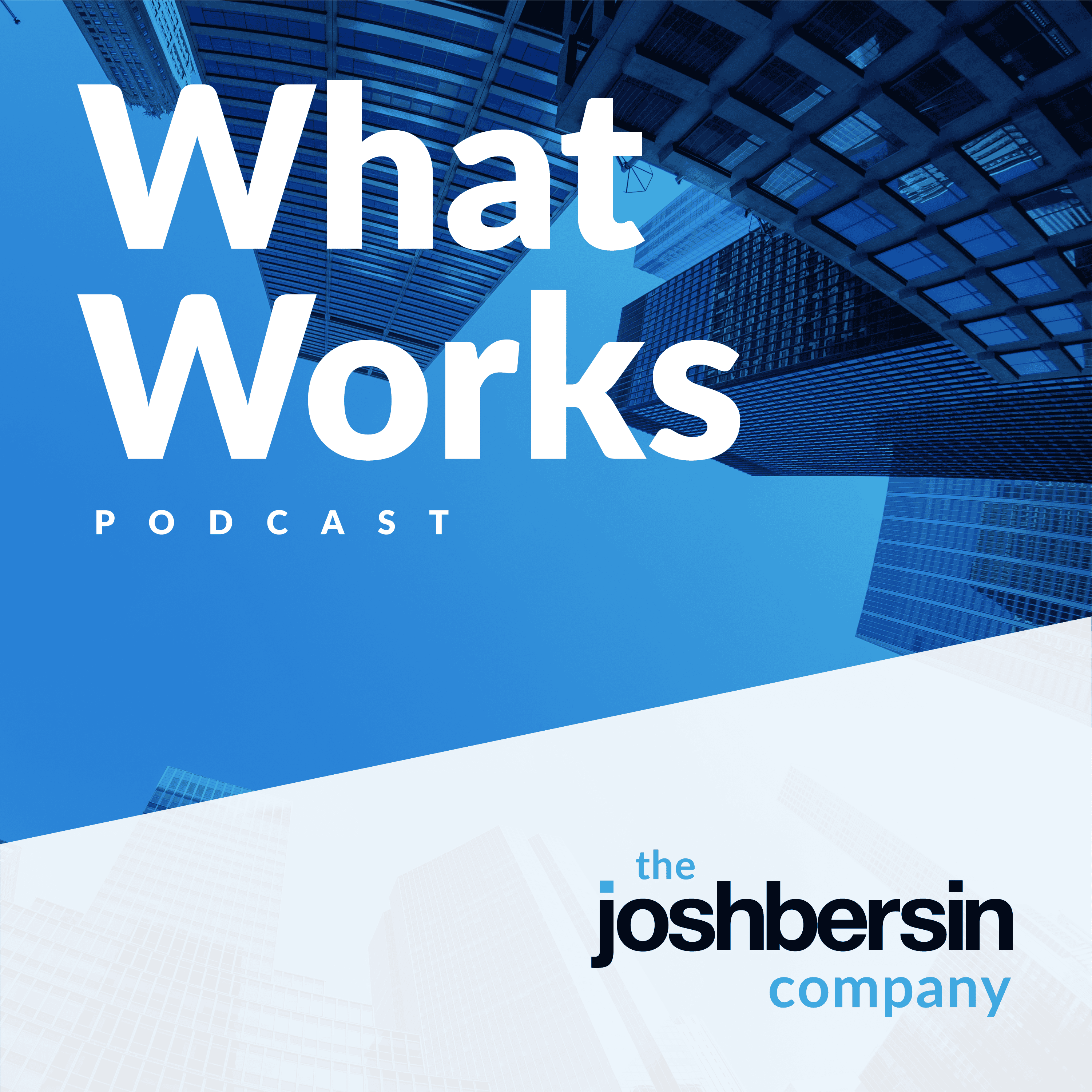Episode Transcript
Speaker 0 00:00:01 Hi, this is Josh Buron. Welcome to Research-Based Perspectives on the Ever-Changing World of Work, leadership, learning, and HR with a heavy dose of insights on the exciting world of HR technology. Hi everyone, this is Josh Burson. It's late September, almost October, and what I want to talk about in this podcast is the pandemic economy. What has really changed because now it's extremely clear, we are in the middle of launching next month a significant piece of research on business resilience, and we're gonna be talking about the 10 most important practices that drive business resilience in the coming year, and they all revolve around this new economy. The first part, there's four parts to it. The first part of the economy I want to talk about is the products and services. Interesting thing about the economy today, even though we have essentially zero interest rates, and the BLS tells us that there's about a one to 1.1% inflation rate on an annual basis, the cost of bicycles has gone up by 7%.
Speaker 0 00:01:10 The cost of medical care has gone up by 6%. The cost of newspapers has gone up by more than 5%. The cost of cleaning products has gone up by 5%. The cost of food, even for those of us getting it from home, has gone up by more than 5%. The cost of media and entertainment online and cable and satellite TV has gone up by 5%. Everything we don't want is getting cheaper, and everything we do want is getting more expensive, and we now know what those things are. What are the things we don't want? Shoes, clothes, public transportation, hotels, airline fairs, and to some degree, face-to-face entertainment. And so the new economy has just like the sorting hat and Harry Potter shaken out the winners and the losers. Tech companies, media companies, companies that sell cleaning products, companies that sell digital tools, pharmaceutical companies, healthcare, distribution.
Speaker 0 00:02:11 Companies are experiencing explosive growth and the others are not. And we now know that this is going to be with us for at least a year to come and probably have a long-term effect on the economy for many years ahead. The second aspect of the pandemic economy is the massive change in culture around the environment. Now, I don't know where you live. I live in California, but it is now very clear and almost 40% of Republicans, and more than 75% of Democrats believe that climate change is the biggest issue in the world. And I have to believe that is becoming true. We have had fires. People in my neighborhood are buying generators because the power's gonna go out. We all have air purifiers down in Arizona. The climate has been over 110 degrees for more days than ever. There are so many hurricanes down in the Southeast that they've run out of letters, lowercase and uppercase letters to name them, and they're now using Greek letters.
Speaker 0 00:03:13 In the Midwest, there have been all sorts of weird tornadoes and windstorms. This is real. Now we can sit around and talk about the fact that the oil industry is important and we wanna protect it, and we're gonna pretend like it's not happening. But it's turning out that every single person in the United States is now affected by climate change. And the predictions are starting to show that cities like Atlanta, New York, and to some degree where I live in the San Francisco Bay area, are going to be massively changed as a result of this. And the private insurance industry is in no way prepared to recover from. The changes are going to take place in my area in the East Bay of San Francisco, for example. We are unlikely to have a fire here, although we have had a significant fire where I live, but we are already seeing a massive change in the air quality, which is affecting people's willingness and interest in moving here.
Speaker 0 00:04:06 So over a very short period of time, there will be massive amounts of migration in the United States caused by the environment. And that has a lot to do with business too, because businesses have to step up, which gets me to the third issue in the pandemic economy, the role of society and business. Now for all of my adult career, we've been talking about companies being responsible, and there have been many, many examples of companies taking responsibility for their environmental impact, their social impact, their diversity, their fairness, their pay equity. But frankly, it's been a relatively small percentage. We still have companies like Volkswagen or others that cheat on their environmental regulations, bend over backwards to do things that look good, but really aren't, and they get caught later. Well, that's changed. Last fall, of course, we had the business round table manifesto on responsibility and stakeholder value, which to some degree was a little bit of a lip service because since then, most of these companies have made enormous profits and not always done the right thing with them.
Speaker 0 00:05:16 But I think that wind is significantly shifting this year. For example, companies like Microsoft Workday and many others have allocated hundreds of millions to billions of dollars to climate change initiatives, buying back carbon credits to undo or reverse the impact they've had on on the environment. We've had a series of meetings with diversity and inclusion leaders in HR leaders all over the world in the investment and growth in diversity, inclusion, belonging, pay equity, fairness is explosive. And I think this is a significant trend, and we're gonna ride this into 2021 with an even bigger focus on companies being good citizens to their stakeholders of all types, employees being perhaps the most important. And by the way, I wanna remind you of something, employees are the most vested stakeholders you have. Customers can change products, shareholders can sell their stock, investors can move their money elsewhere, but employees have voted with their lives to work for your companies.
Speaker 0 00:06:25 So when you take care of your employees and listen to them, you are taking care of the most important stakeholders you have. The fourth area of the pandemic economy is the enormous change and growth in empathy and trust. Now, I'm not talking about the federal government and I'm not talking about the President of the United States. That's an exception. And we're gonna just have to live through this, whatever happens in the United States, and hopefully the outcome will be positive. But from the standpoint of the private sector, for those of us that work in businesses, there's no question in my mind, and this comes out of the pandemic response research we're publishing in October, that empathy and trust are two of the most important characteristics of successful companies in the economy ahead. Empathy means you listen, you understand, you don't force people to come back to work unless they're ready, and you do things to the workplace and for the workforce that will make people's jobs easier and give them the opportunity to be more productive.
Speaker 0 00:07:28 At an interesting conversation with the head of HR of a very large defense contractor just this week, and she told me, the CEO has mandated that people come into the office regardless of how they feel, and she said their turnover rate has skyrocketed. They're having a very hard time hiring people, and she thinks it's gonna have long-term damage on the company. That's just one of many examples of how important empathy is in the area of trust. Trust, as I've talked about in a couple of other podcasts, trust is one of the most important and perhaps fleeting issues in the economy today, and we have to build it in our organizations. What does it mean to deliver trust? It really means three things. Number one, it means competence. It means doing a great job, running the trains on time, taking care of your customers, making sure your products are good, and that they're distributed in a fair way, and that your people are treated fairly.
Speaker 0 00:08:24 If the trains don't run on time, if the planes are late, you don't trust the company. And so competence is the number one characteristic and trust, and this is why we don't trust the federal government. Number two is ethics, fairness, pay equity, diversity, transparency, sharing what's going on inside the company in an open and fair way so people can understand what's going on, and equity is essentially guaranteed. And the third is listening. Always listening to employees, always listening to customers, always listening to the market. In fact, for many years I've felt that one of the most important things in business is not making a profit. It's really listening to your customers and solving their problems. And that goes for employees too. Profits are an outcome of a great business, not a goal. So the pandemic economy is interesting. It really has been a big reset.
Speaker 0 00:09:24 If you go back to February or March, when I first published the article on the Big Reset and reflected on the fact that over the last 12 years before this year, we were undergoing a steady economic growth and the job market was getting tighter and the economy was becoming more competitive, and companies were scrambling harder and harder and harder to compete, we knew that eventually some straw was going to break the camels back. And it has happened. The pandemic started it, but we now have a new economy. The four elements of it are new products and services, a bigger and much more significant focus on culture and the environment, a new role of business and society, and an incredibly important focus on empathy and trust. I hope this has been an interesting discussion today. Please look for our research coming out next month on Business Resilience. It's based on more than 1400 companies contributing to our research over the last couple of months, and I think you'll find it extremely useful. Thank you very much.
Speaker 0 00:11:02 If you like what you heard, please join the Josh Bersen Academy, the world's professional development academy for hr for less than a cost of a nice dinner in a town near you. You can have an entire year's access to hundreds of courses, articles, research studies, case studies, and an entire community of more than 10,000 HR professionals all collaborating with each other to help you learn and solve the problems in your particular company. We call the Buron Academy, the world's home for hr, and you'll find it to be one of the most important parts of your career and your company's HR strategy for the years ahead. Thank you.


